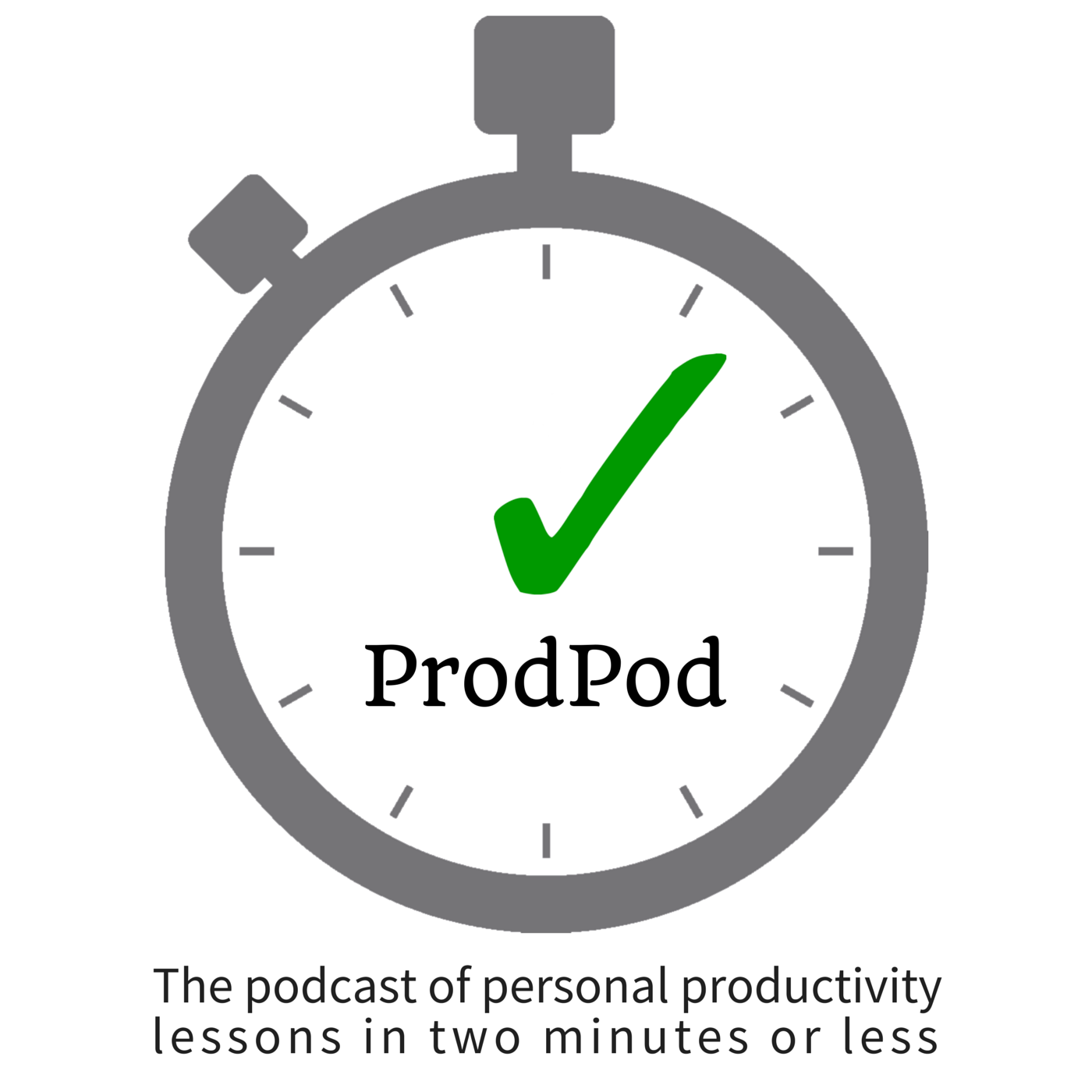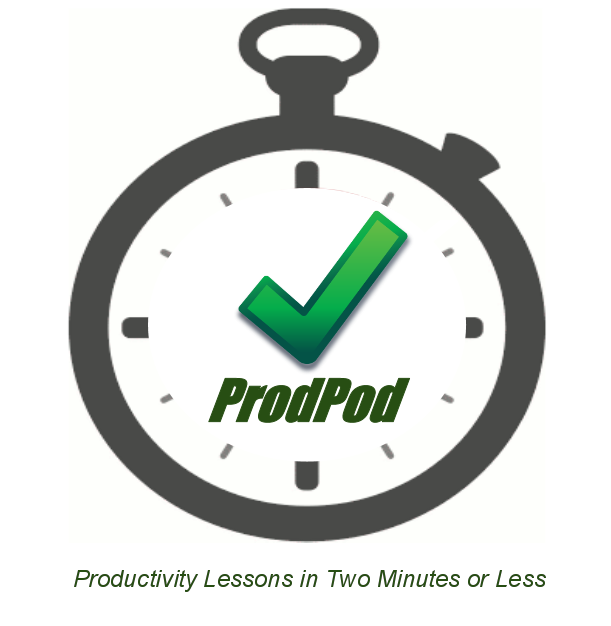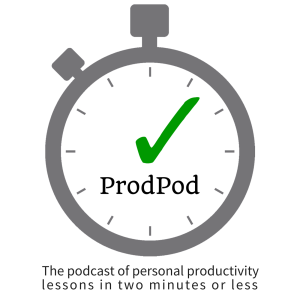Episodes

Wednesday Oct 01, 2014
Wednesday Oct 01, 2014
Welcome to Episode 86 of ProdPod, the podcast of productivity lessons in two minutes or less. I’m Ray Sidney-Smith and I have Professional Organizer Sally Reinholdt here for Part 2 of our discussion of One Small Step Can Change Your Life: The Kaizen Way by psychologist [ http://amzn.to/1lKpijP ], by Dr. Robert Maurer. We’ll be covering the elements of Kaizen. Sally, take it away.

Wednesday Oct 01, 2014
Wednesday Oct 01, 2014
Welcome to Episode 85 of ProdPod, the podcast of productivity lessons in two minutes or less. I’m Ray Sidney-Smith and I have Professional Organizer Sally Reinholdt back on ProdPod to tell us about One Small Step Can Change Your Life: The Kaizen Way by psychologist [ http://amzn.to/1lKpijP ], by Dr. Robert Maurer. So, Sally, what is The Kaizen Way?

Sunday Aug 31, 2014
Sunday Aug 31, 2014
I first became aware of Shawn Achor as the funny, charismatic presenter of the popular TEDxBloomington Talk, "The Happiness Advantage: Linking Positive Brains to Performance.” And, subsequently, I came to know his eponymous book, The Happiness Advantage: The Seven Principles of Positive Psychology That Fuel Success and Performance at Work. His book’s premise is, I quote,
Conventional wisdom holds that if we work hard we will be more successful, and if we are more successful, then we’ll be happy. If we can just find that great job, win that next promotion, lose those five pounds, happiness will follow. But recent discoveries in the field of positive psychology have shown that this formula is actually backward: Happiness fuels success, not the other way around. When we are positive, our brains become more engaged, creative, motivated, energetic, resilient, and productive at work. This isn’t just an empty mantra.

Thursday May 01, 2014
ProdPod: Episode 83 -- 31 Folders Instead of the GTD 43 Folders
Thursday May 01, 2014
Thursday May 01, 2014
If you are familiar with Getting Things Done by David Allen, or the GTD methodology, you probably know about the 43 folders concept. If you don’t, basically, it’s a tickler file-like tool where physical, time-based items can be managed. There are, you guessed it, 43 folders, constituting 12 file folders for the 12 months in the year and 31 folders representing the maximum number of days in any given month. In this episode I’d like to detail how I simplified this powerful paper organization tool, and hope it’s useful to those out there that still have much paper-based organizing in their worlds like I do.

Friday Apr 25, 2014
ProdPod: Episode 82 -- Procrasti-Doing
Friday Apr 25, 2014
Friday Apr 25, 2014
There’s a common misconception about procrastination that it only means you’re not doing something you planned to do. Many times we are unaware that procrastination is usually coupled with doing something, if not the thing we planned. This is what I call “procrasti-doing.” And there are some practical measures you can take to procrasti-doing when you want, and when you don’t, so I thought I’d explain them here in this episode.
One of the frequent stories I hear is something like this: “I was supposed to be working on my project, but instead I found myself rearranging the pens and pencils in my drawer.” This is the first classic case of procrasti-doing. One tactic for overcoming this is to think about whether or not your pens and pencils really do need organizing. If that is the case, then perhaps putting that on a project or task list for you to handle later would help you free up the mental bandwidth to get back on task. That goes for any other tasks or projects that might be floating around in your head as you set yourself up to handle any project. This minimizes procrasti-doing and maximizes your brain’s energy to focus.
The other case where procrasti-doing takes hold of us often is when you start doing the tasks in a project out of order or unimportant tasks associated with a project that really won’t move the project toward completion. This might include re-labeling all the project support folders for a major project. Or, one might take to Social Media to engage there about the project instead of actually working on the tasks toward the project’s completion. In this situation, the best approach is two-pronged: first, allow yourself a set amount of time to close out the current activity when you find yourself doing the unproductive procrasti-doing, then re-focus back on starting the next task toward project completion. Remember, it’s about (as Dr. Neil Fiore says in “The Now Habit”) persistent starting.
One final thought I have about procrasti-doing: many times your unconscious mind needs time to problem-solve the project or task you are currently trying to work on. In these cases, it might make perfect, productive sense for you to let your mind wander to other activities while your unconscious does the heavy lifting necessary to help you craft an effective solution. Organizing pens and pencils never sounded so productive.

